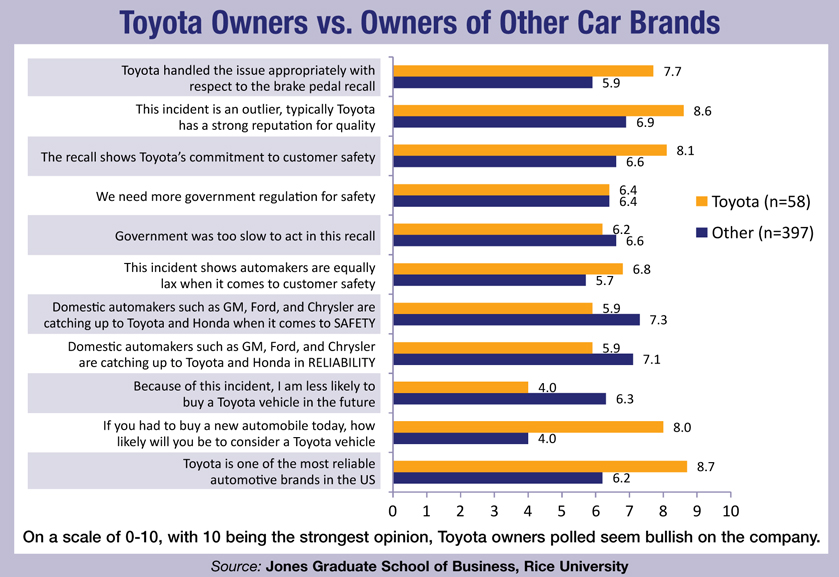If Toyota were tried in the court of media and automobile expert opinion, the company would likely be executed sometime soon. However, if the company’s customers made up the jury, it’s possible Toyota could do a year in jail at worst, and at best 90 days probation.
That’s what the findings of a recent study out of Rice University’s Jones Graduate School of Business show. Despite hundreds of negative stories generated by the press and predictions of the company’s demise by experts, customers remain loyal. In a survey of 455 U.S. car owners (of which 58—12.8%—were Toyota owners), the overall level of satisfaction of those owners with their vehicles was high. In fact, they were higher than owners of other car brands (see graphic below).
Vikas Mittal, a professor of marketing at Jones Graduate School, who led the study, says the results illustrate the concept of “selection bias” by the media, in which it negatively reports isolated incidents while ignoring the sentiments of key stakeholders (like customers).
“This study shows that customers aren’t basing their opinions on media coverage,” says Mittal. “Many have had Toyotas for years and have had good experiences with them.”

A case in point: car owners’ views on the Toyota recalls. First, Toyota owners, compared to owners of other vehicles, agreed more strongly that Toyota appropriately handled issues with respect to the brake-pedal recall. Secondly, when compared to owners of other brands, Toyota owners believed that this incident is an outlier, and that typically Toyota has a stronger reputation for quality than other brands.
The study findings are a perfect example of Al Golin’s “trust bank” concept, says Jason Karpf, a PR and marketing consultant based in Los Angeles. “When a company builds up a good reputation, it draws on that during bad times,” says Karpf.
Another factor that generated the findings is brand relativity: “Consumers are not finding any other car brands to be vastly superior in terms of trust and quality,” says Karpf.
So will results such as this affect Toyota’s PR strategy going forward? Karpf thinks it might. “If Toyota senses support from its core customers, they will go more on the offensive,” he says.
But Mike Paul of MGP & Associates PR says the damage has been done. “When you’ve breached trust, you don’t get a lot of shots after that,” says Paul. “Now you have people concerned about a gas pedal—and that’s pretty significant.” Paul suggests radio silence by Toyota until the problem is solved 100%. “If you don’t have the ability to find the problem, then maybe you shouldn’t be in the car business,” he says. PRN
CONTACT:
Vikas Mittal, [email protected]; Jason Karpf, [email protected]; Mike Paul, [email protected].
